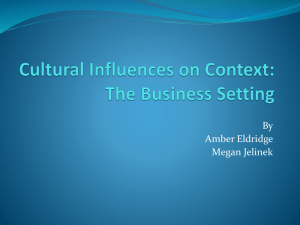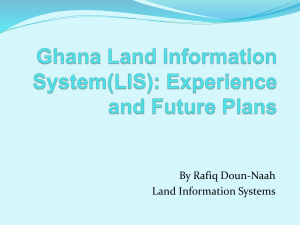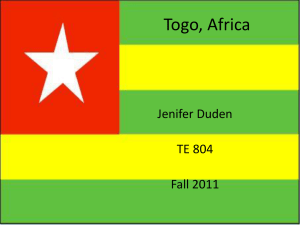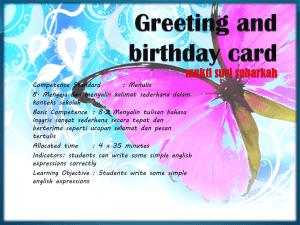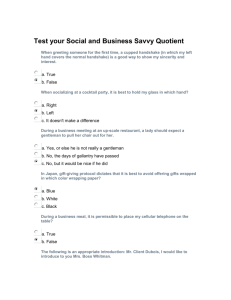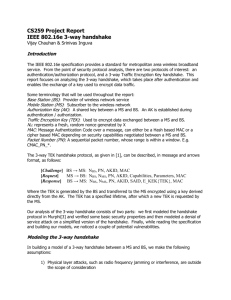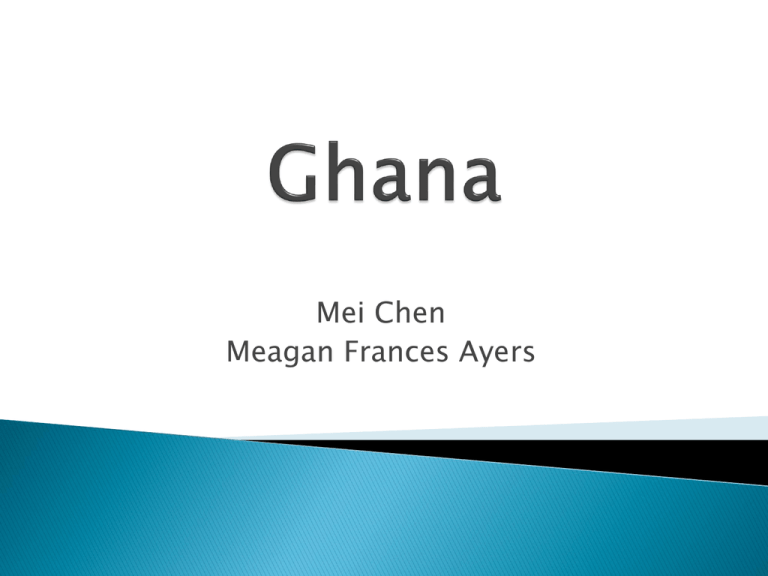
Mei Chen
Meagan Frances Ayers
2 Steps:
1. Determine the 12 Core Cultural Values
2. Think of an activity, event, object, or phenomenon
to personify these 12 Core Cultural Values
1.
2.
3.
4.
5.
6.
7.
8.
9.
10.
11.
12.
Human Nature
Purpose In Life (Doing or Being)
Societal Role
Nature/Fate
Time
Communication (Preferred Modes)
Power Distance
Uncertainty Avoidance
Masculinity/Femininity
Universalistic/Particularistic
Specific/Diffuse
Status
Most Ghanaians would agree that:
1. People are a mix of good and evil.
2. The purpose of life is a mix of doing and being.
3. Decisions are made collectively as a group rather
than by individuals.
4. They cannot control everything but they believe
the decisions they make determine their fate.
5. You should make the most of the present rather
than focusing on yesterday of tomorrow.
6. Indirect communication is best to avoid
confrontations.
Most Ghanaians would agree that:
7. Unequal distribution of power is necessary for all
people of that society.
8. Unpredictable situations are seen as opportunities
rather than hindrances.
9. Gender roles are blurred so men and women have
the same opportunities and family is always a
factor in decision making.
10. The good of the group always comes before the
good of an individual.
11. Your intentions are more important that the
specifics of a situation.
12. Status should be publicly demonstrated to show
your place in society.
Kente
How does Kente personify the
Ghanaian culture?
1. People are a mix of good and evil.
OBI NKYE OBI KWAN MU SI
“To err is human”
2. The purpose of life is a mix of doing and being.
3. Decisions are made collectively as a group rather
than by individuals.
OBAAKOFOO MMU MAN
“One person does not
rule a nation”
4. They cannot control everything but they believe
the decisions they make determine their fate.
5. You should live in the present rather than
focusing on yesterday or tomorrow.
6. Indirect communication is best to avoid
confrontations.
7. Unequal distribution of power is necessary for all
people of that society.
ADWINASA
“All motifs are used up”
8. Unpredictable situations are seen as opportunities
rather than hindrances.
EMAA DA
“It has not happened
before"
9. Gender roles are blurred so men and women have
the same opportunities and family is always a
factor in decision making.
ABUSUA YE DOM
“The extended family
is a force"
10. The good of the group always comes before the
good of an individual.
WOFRO DUA PA
A NA YEPIA WO
“One who climbs a
tree worth climbing
gets the help deserved"
11. Your intentions are more important that the
specifics of a situation.
Silver Thread
12. Status should be publicly demonstrated to show
your place in society.
SIKA FUTORO
“Gold dust”
Use of the left hand
Don’t call anyone silly
Don’t Do This
Dress Attire
◦ Dress modestly
◦ Wear business suits for formal meetings
◦ Remove hats when speaking to an elderly person or
chief to show respect
Table Manners
◦ Pay for a meal if you invited a person
◦ Alcohol: You may drink, but do not get publicly
intoxicated.
Put drink to lips, don’t sip, pour drink on ground
◦ Don’t blow nose
◦ Don’t use left hand
◦ Don’t tip unless you had exceptional service (5%10%)
Body Gestures
◦ Do not sit with legs crossed
◦ Hand holding
◦ Left hand
Greetings
◦
◦
◦
◦
Handshake and Smile
Greet everyone; starting with the most elderly
Handshake upon departure
Don’t use left hand
Photographs
◦ Do not take pictures of scared grounds
◦ Do not take pictures at state house, prisons,
airports, etc…
◦ Ask prior to capture
Miscellaneous
◦ Do not be late for business
appointments
◦ Do not speak directly with a
chief or king; use a third party
linguist
◦ Offer gifts such as Schnapps,
gin, or money to chiefs, kings
or hosts
◦ Visitors will ask about you
intention of visits, be honest
Involving:
Communication
Management style
Organizational structure
Negotiating
Train employees to interpret what is being
said
Avoid confrontational topics
“Yes” might be said to prevent
embarrassment but may not be meant
Proverbs are used to convey a subtle message
Silence is appreciated
Higher position- more power and decision
making
Decision making does not require consulting
with “lower” employees
Managers concern themselves with employee
life outside of work
Deadlines have become more important
Avoid criticism publically and privately
Hierarchy: “top down”
Respect elders and those in senior positions
Order is kept
Individuals that make up the group determine
the success or failure of the project
Build a relationship; it may take some time
Realize that negotiations will take time
Avoid rushing the other party
Avoid impatience and anger
Avoid assuming the negotiation is going well
if there is a lack of disagreements or
challenges
United States
Ghana
Purpose in life: live to work
Purpose in life: mix of doing and
being
Societal role: individualistic
Societal role: collectivists
Mode of communication: direct,
low context
Mode of communication: indirect,
high context
Time: future oriented
Time: present oriented
Management style: group oriented, Management style: higher position
everyone has an input
has more power and makes
decisions
Negotiation: involves a contract
Negotiation: involves building a
relationship
Confrontations: addressed if there
are any
Confrontations: avoided
Work vs. Social life: professional
and social life are kept separate
Work vs. Social life: mixed together
United States
Ghana
Low Power Distance: Inequalities of
power are not acceptable
High Power Distance: Inequality in
status and power are accepted and
embraced
Low Uncertainty Avoidance: Risks and
unpredictable situations are embraced
Low Uncertainty Avoidance: Risks and
unpredictable situations are embraced
Masculine: Gender roles are clearly
defined and adhered to while family in
decision making is put on the back
burner
Feminine: Gender roles are blurred and
family is a major decision making
factor
Universalistic/Individualistic: Interest of
group over individual interest
Particularistic/Collectivist: Individual
interest over group interest
Specific: We want you to just get to the
point so we can make a decision
Diffuse: Intentions are more important
than the situation
Status is not flaunted in public as
everyone wants to be treated equally
Those of high wealth and status are
expected to show it in public so people
are aware
United States
Ghana
Attire: Less conservative
Attire: More conservative
Tip Generously
Don’t Usually Tip
Free use of both hands
Never use your left hand
Greeting: Greet everyone in no
particular order
Greeting: Greet elderly first
Greeting: Handshake
Greeting: Handshake and smile
Hand Holding is acceptable only
among opposite sex
Hand Holding is acceptable only
among same sex
Speak directly with anyone
Do not speak directly to kings or
chiefs; use a third party linguist
Photography: Capture anything
Photography: Ask permission and
not sacred grounds
Best wishes in your future travels to Ghana

